英文议论文素材大全——转基因食品的利与弊
转基因的利弊英语作文
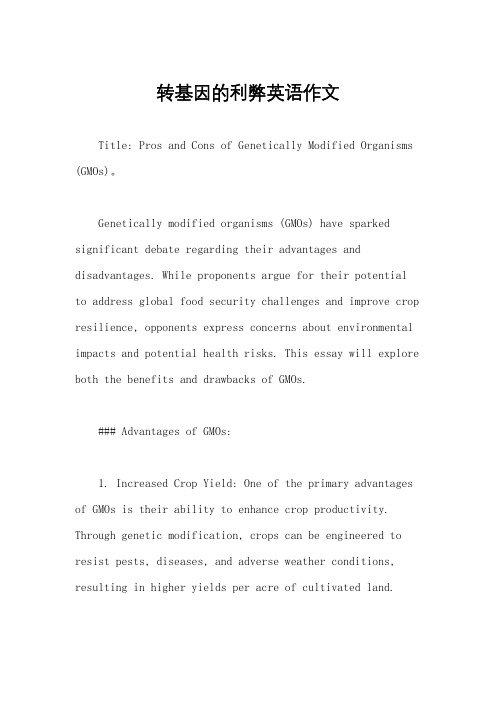
转基因的利弊英语作文Title: Pros and Cons of Genetically Modified Organisms (GMOs)。
Genetically modified organisms (GMOs) have sparked significant debate regarding their advantages and disadvantages. While proponents argue for their potential to address global food security challenges and improve crop resilience, opponents express concerns about environmental impacts and potential health risks. This essay will explore both the benefits and drawbacks of GMOs.### Advantages of GMOs:1. Increased Crop Yield: One of the primary advantages of GMOs is their ability to enhance crop productivity. Through genetic modification, crops can be engineered to resist pests, diseases, and adverse weather conditions, resulting in higher yields per acre of cultivated land.2. Improved Nutritional Content: GMOs offer the potential to enhance the nutritional value of crops. For example, scientists can genetically modify rice to contain higher levels of essential nutrients such as vitamin A, addressing malnutrition in regions where rice is a staple food.3. Reduced Dependency on Chemical Pesticides: Genetic engineering enables the development of crops with built-in resistance to pests and diseases, reducing the need for chemical pesticides. This can lead to lower production costs for farmers and minimize the environmental impact of agricultural practices.4. Drought and Salinity Tolerance: GMOs can be engineered to withstand harsh environmental conditions such as drought and soil salinity. This trait is particularly valuable in regions prone to water scarcity and soil degradation, where conventional crops may struggle to survive.5. Innovative Medical Applications: Geneticmodification extends beyond agriculture to medical research. GMOs have facilitated the production of pharmaceuticals, vaccines, and insulin, offering new avenues for disease treatment and prevention.### Disadvantages of GMOs:1. Environmental Concerns: Critics raise concerns about the environmental impact of GMOs, including the potentialfor unintended consequences such as the development of resistant pests and the loss of biodiversity. Cross-pollination between genetically modified and wild plants may also pose risks to native species.2. Health Risks: While GMOs undergo rigorous safety assessments before commercialization, some studies suggest potential health risks associated with their consumption. Concerns range from allergic reactions to antibiotic resistance genes transferring to gut bacteria.3. Corporate Control of Agriculture: The dominance of large biotechnology corporations in the GMO industry raisesquestions about monopolistic practices and farmer dependency on patented seeds. Critics argue that this concentration of power undermines agricultural diversity and local food sovereignty.4. Ethical Considerations: GMOs raise ethical dilemmas regarding the alteration of genetic material and the commodification of life. Questions about the long-term consequences of manipulating the genetic makeup of organisms remain unresolved, challenging societal values and moral principles.5. Labeling and Consumer Choice: The debate over mandatory labeling of GMO products reflects broader concerns about consumer rights and transparency in the food industry. Some consumers advocate for clear labeling to make informed choices about the products they purchase, while others argue that labeling requirements impose unnecessary burdens on producers.In conclusion, the debate surrounding GMOs underscores the complexity of balancing potential benefits withinherent risks. While genetic engineering offers promising solutions to global challenges, including food insecurity and environmental degradation, caution must be exercised to mitigate adverse impacts on ecosystems and human health. Continued research, transparent regulation, and public engagement are essential for navigating the ethical, social, and scientific dimensions of GMOs in the pursuit of sustainable agriculture and equitable food systems.。
转基因利与弊英语作文

转基因利与弊英语作文英文回答:Transgenic technology, also known as genetic engineering, has been a topic of debate for many years. On one hand, it offers numerous benefits such as increased crop yield, resistance to pests and diseases, and improved nutritional content. However, there are also drawbacks to this technology, including potential harm to the environment and human health, as well as ethical concerns.One of the major advantages of transgenic technology is its ability to enhance crop productivity. For example, scientists have developed transgenic crops that are resistant to herbicides, allowing for more efficient weed control and higher yields. This can help address food security issues in many parts of the world. In addition, transgenic technology has been used to create crops with enhanced nutritional content, such as golden rice, which contains higher levels of vitamin A. This has the potentialto address malnutrition in developing countries.However, there are also concerns about the potential negative impacts of transgenic technology. For example, the use of genetically modified organisms (GMOs) in agriculture has raised concerns about the potential for unintended harm to the environment, such as the development of herbicide-resistant weeds and the loss of biodiversity. There are also concerns about the potential health risks of consuming GMOs, although the scientific consensus is that GMOs currently on the market are safe to eat.In addition to environmental and health concerns, there are also ethical considerations surrounding transgenic technology. For example, some people believe that it is wrong to manipulate the genetic makeup of living organisms, and that doing so could have unforeseen consequences. There are also concerns about the corporate control of transgenic technology, with some critics arguing that it could lead to the concentration of power and wealth in the hands of a few large corporations.In conclusion, transgenic technology has the potentialto offer significant benefits, such as increased cropyields and improved nutritional content. However, there are also drawbacks and concerns that need to be carefully considered. It is important to weigh the potential benefits against the potential risks and to proceed with caution when using transgenic technology.中文回答:转基因技术,也被称为基因工程,多年来一直是一个争论的话题。
转基因食品利弊作文英语

转基因食品利弊作文英语英文回答:Genetically modified (GM) foods, also referred to as genetically engineered (GE) foods, have sparked considerable debate due to their potential benefits and risks.Benefits of GM Foods:Increased crop yields: GM crops can be engineered to resist pests and diseases, reducing crop losses and increasing overall yield. This can help address food security concerns in developing countries.Improved nutritional value: GM foods can be enhanced to contain higher levels of vitamins, minerals, and other nutrients. This has the potential to combat malnutrition and improve public health.Resistance to environmental stressors: GM crops can be engineered to tolerate drought, heat, and other environmental stressors. This can increase agricultural productivity in challenging environments and reducereliance on synthetic fertilizers and pesticides.Risks of GM Foods:Health concerns: Critics argue that the long-term health effects of consuming GM foods are not fully understood. Concerns include potential allergies, increased toxicity, and antibiotic resistance due to the insertion of foreign genes.Environmental impact: GM crops can cross-pollinate with non-GM varieties, potentially introducing novel genes into natural ecosystems. This raises concerns about unintended consequences on biodiversity and gene flow.Economic issues: The development and commercialization of GM seeds can involve significant intellectual property rights and control by biotechnology companies. This cancreate concerns about farmer autonomy and market competition.Weighing the Benefits and Risks:The debate over GM foods is complex and requirescareful consideration of the potential benefits and risks. While GM foods have the potential to address food security and improve nutrition, concerns about health and environmental impacts must be thoroughly evaluated through rigorous scientific research and oversight.中文回答:转基因食品利弊。
转基因食物利弊英语作文带翻译
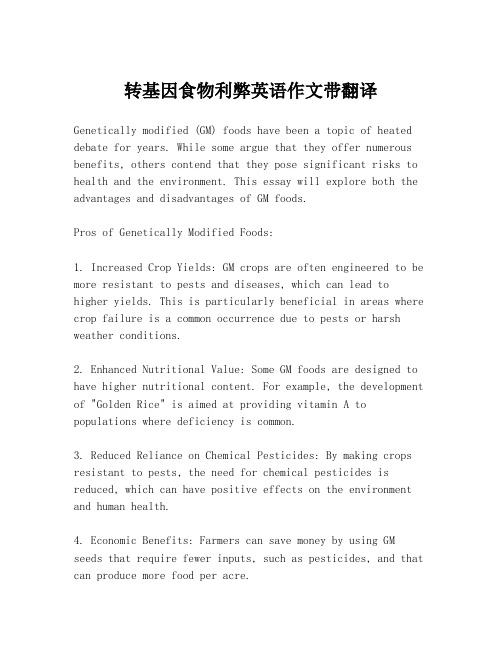
转基因食物利弊英语作文带翻译Genetically modified (GM) foods have been a topic of heated debate for years. While some argue that they offer numerous benefits, others contend that they pose significant risks to health and the environment. This essay will explore both the advantages and disadvantages of GM foods.Pros of Genetically Modified Foods:1. Increased Crop Yields: GM crops are often engineered to be more resistant to pests and diseases, which can lead to higher yields. This is particularly beneficial in areas where crop failure is a common occurrence due to pests or harsh weather conditions.2. Enhanced Nutritional Value: Some GM foods are designed to have higher nutritional content. For example, the development of "Golden Rice" is aimed at providing vitamin A to populations where deficiency is common.3. Reduced Reliance on Chemical Pesticides: By making crops resistant to pests, the need for chemical pesticides is reduced, which can have positive effects on the environment and human health.4. Economic Benefits: Farmers can save money by using GM seeds that require fewer inputs, such as pesticides, and that can produce more food per acre.Cons of Genetically Modified Foods:1. Potential Health Risks: There are concerns that GM foods may cause allergic reactions or other health problems, although scientific consensus has not yet fully established these risks.2. Environmental Impact: Critics argue that GM crops can crossbreed with wild plants, leading to the spread ofmodified genes in the wild, which could have unforeseen ecological consequences.3. Monoculture and Loss of Biodiversity: The widespread adoption of GM crops can lead to a reduction in agricultural biodiversity, as farmers may choose to grow only a few GM varieties.4. Corporate Control: Many GM seeds are patented by large corporations, which can lead to increased costs for farmers and a dependency on these companies for seeds.In conclusion, while GM foods offer the potential for increased food security and enhanced nutrition, there arevalid concerns regarding their safety and environmental impact. It is crucial for ongoing research and transparent labeling to ensure that the benefits of GM foods can be realized without compromising human health or the environment.翻译:转基因(GM)食品多年来一直是激烈争论的话题。
转基因食品的利与弊英语作文

转基因食品的利与弊英语作文Title: Pros and Cons of Genetically Modified Foods。
Genetically modified foods (GM foods) have been a subject of debate for quite some time. While proponents argue for their potential to address food security and nutritional deficiencies, opponents raise concerns about their safety and long-term impacts on human health and the environment. In this essay, we will delve into the advantages and disadvantages of genetically modified foods.Advantages:1. Increased Crop Yield: One of the primary benefits of GM foods is their potential to increase crop yield. Through genetic modification, crops can be engineered to resist pests, diseases, and adverse environmental conditions, leading to higher productivity per acre of land.2. Enhanced Nutritional Value: Genetic engineeringenables the enrichment of crops with essential nutrients, such as vitamins and minerals. For example, Golden Rice, engineered to produce beta-carotene, addresses vitamin A deficiency in regions where rice is a staple food.3. Reduced Dependency on Pesticides: GM crops can be engineered to possess inherent resistance to pests and diseases, thereby reducing the need for chemical pesticides. This not only minimizes environmental pollution but also lowers production costs for farmers.4. Extended Shelf Life: Some genetically modifiedfruits and vegetables exhibit traits that prolong theirshelf life, reducing food wastage during storage and transportation. This is particularly advantageous in addressing hunger and malnutrition in remote areas.5. Environmental Sustainability: Certain GM crops are designed for enhanced nitrogen fixation or drought tolerance, reducing the need for excessive irrigation and fertilizers. This promotes sustainable agriculturepractices and conserves natural resources.Disadvantages:1. Health Concerns: Opponents of GM foods express apprehensions regarding their potential long-term health effects on humans. There are concerns about allergic reactions, antibiotic resistance, and unforeseen consequences of genetic modifications that may not manifest immediately.2. Environmental Risks: The cultivation of GM crops may pose environmental risks, such as the unintentional spread of genetically modified organisms (GMOs) to wild plant populations, disrupting ecosystems and biodiversity. Additionally, the emergence of superweeds and superbugs resistant to GM crop traits is a growing concern.3. Economic Implications: The dominance of GM crops in agricultural systems can lead to economic disparities, as small-scale farmers may face challenges accessing expensive GM seeds and technologies. Moreover, the patenting of genetically modified seeds by biotechnology corporationsraises issues of intellectual property rights and monopolistic control over agricultural production.4. Loss of Traditional Varieties: The widespread adoption of GM crops has led to the displacement of traditional crop varieties adapted to local environments and cultural practices. This loss of agricultural biodiversity diminishes resilience to pests, diseases, and climate change.5. Ethical Dilemmas: Genetically modifying organisms raises ethical questions regarding the manipulation of nature and the commodification of life. Concerns about corporate control over food production, transparency in labeling GM products, and the right of consumers to make informed choices are central to the ethical debate surrounding GM foods.In conclusion, genetically modified foods offer potential benefits in terms of increased crop yield, enhanced nutritional value, and environmental sustainability. However, they also pose significantchallenges and risks, including health concerns, environmental impacts, economic disparities, loss of biodiversity, and ethical dilemmas. As the debate continues, it is essential to weigh the advantages and disadvantagesof GM foods while ensuring robust regulatory frameworks and transparency in decision-making processes.。
转基因食品利弊作文英语
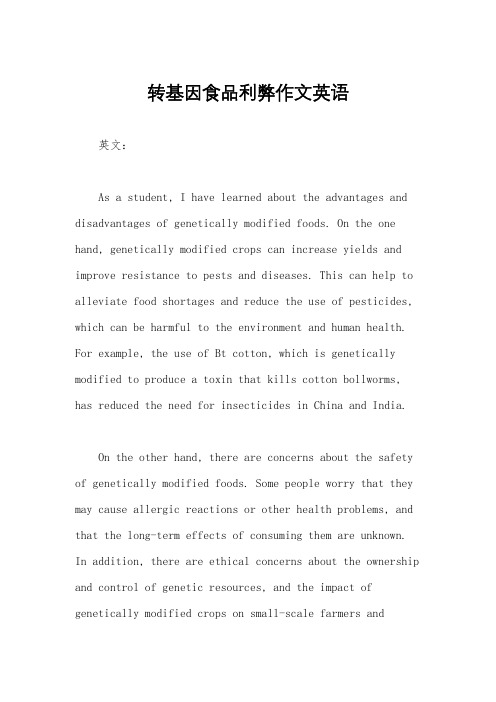
转基因食品利弊作文英语英文:As a student, I have learned about the advantages and disadvantages of genetically modified foods. On the one hand, genetically modified crops can increase yields and improve resistance to pests and diseases. This can help to alleviate food shortages and reduce the use of pesticides, which can be harmful to the environment and human health. For example, the use of Bt cotton, which is genetically modified to produce a toxin that kills cotton bollworms, has reduced the need for insecticides in China and India.On the other hand, there are concerns about the safety of genetically modified foods. Some people worry that they may cause allergic reactions or other health problems, and that the long-term effects of consuming them are unknown. In addition, there are ethical concerns about the ownership and control of genetic resources, and the impact of genetically modified crops on small-scale farmers andbiodiversity.Despite these concerns, I believe that genetically modified foods can be beneficial if they are carefully regulated and tested for safety. I think that consumers should have the right to know if their food contains genetically modified ingredients, so that they can make informed choices about what they eat. In addition, I think that more research is needed to understand the long-term effects of genetically modified foods on human health and the environment.中文:作为一名学生,我学习了关于转基因食品的利弊。
转基因食品的利与弊 英语作文

转基因食品的利与弊转基因食品(Genetically Modified Food,简称GMF)是指通过基因工程技术将一种或多种外源基因导入植物、动物或微生物中,使其具有某种特定的性状或功能。
转基因食品在全球范围内引起了广泛的关注和争议。
在这篇文章中,我们将探讨转基因食品的利与弊。
利:1.增加产量和改善品质转基因技术可以使作物具有抗虫、抗病能力,从而减少农药的使用,提高农作物的产量。
此外,转基因作物还可以改善产品的品质,使其更加耐储存和耐运输,从而减少食物损耗。
2.解决饥饿问题全球人口不断增长,而农田面积有限。
转基因技术可以使作物更加耐旱、耐盐碱,适应不同的生长环境。
这有助于解决饥饿问题,提供更多的粮食供应。
3.改善营养价值通过转基因技术,科学家可以增加作物中特定的营养成分,如维生素、矿物质等。
这有助于满足人们对健康和营养的需求。
4.环境友好转基因作物可以减少对土壤和水资源的需求,并减少对农药的依赖。
这对于环境保护和可持续农业发展具有重要意义。
弊:1.安全性问题人们对转基因食品的安全性存在担忧。
一些人担心转基因食品可能对人体健康产生潜在的风险,尽管科学研究尚未明确证明这一点。
此外,长期食用转基因食品可能会导致转基因物质在人体内积累,对人体健康产生不良影响。
2.生态风险转基因作物可能对生态系统产生负面影响。
例如,转基因作物可能对其他植物和动物产生杀伤性效应,破坏生物多样性。
此外,转基因作物的杂交可能导致不可预测的生态效应。
3.伦理和道德问题一些人认为转基因技术涉及人类的生命和自然界的基本规律,应该受到伦理和道德的约束。
他们认为,人类没有权利改变生物的基因组,这种干涉可能破坏自然界的平衡。
4.可持续发展问题转基因技术在某种程度上可能促进了大规模农业,导致土地集约化、农业生态系统破坏等问题。
这可能与可持续发展的原则相冲突。
综上所述,转基因食品具有一些潜在的利益,如增加产量、改善品质、解决饥饿问题和改善营养价值。
转基因食品的优缺点 英语作文
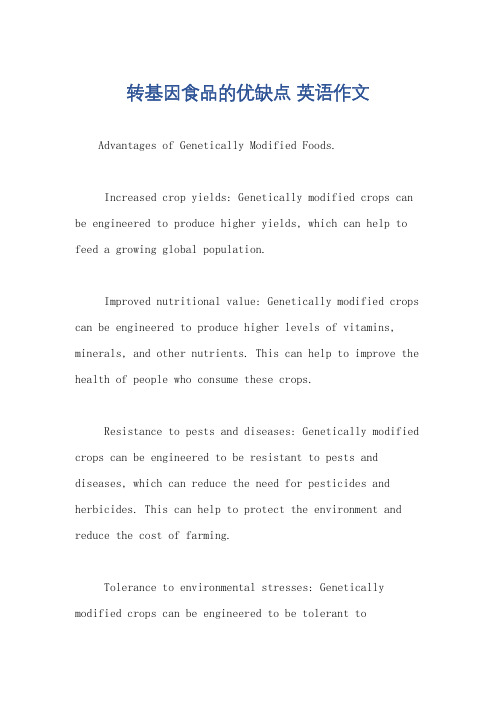
转基因食品的优缺点英语作文Advantages of Genetically Modified Foods.Increased crop yields: Genetically modified crops can be engineered to produce higher yields, which can help to feed a growing global population.Improved nutritional value: Genetically modified crops can be engineered to produce higher levels of vitamins, minerals, and other nutrients. This can help to improve the health of people who consume these crops.Resistance to pests and diseases: Genetically modified crops can be engineered to be resistant to pests and diseases, which can reduce the need for pesticides and herbicides. This can help to protect the environment and reduce the cost of farming.Tolerance to environmental stresses: Genetically modified crops can be engineered to be tolerant toenvironmental stresses such as drought, heat, and cold. This can help to ensure that crops can be grown in a wider range of climates, which can improve food security.Reduced food waste: Genetically modified crops can be engineered to have a longer shelf life, which can reduce food waste. This can help to save money and reduce the environmental impact of food production.Disadvantages of Genetically Modified Foods.Potential for unintended consequences: Genetically modified crops could have unintended consequences for the environment and human health. For example, genetically modified crops could cross-pollinate with wild plants, creating new superweeds that are resistant to herbicides.Potential for allergic reactions: Genetically modified crops could produce new proteins that could triggerallergic reactions in some people.Potential for antibiotic resistance: Some geneticallymodified crops contain genes that confer antibiotic resistance. This could make it more difficult to treat bacterial infections in humans and animals.Loss of biodiversity: Genetically modified crops could lead to a loss of biodiversity, as farmers may choose to grow a smaller number of high-yielding, genetically modified crops.Ethical concerns: Some people have ethical concerns about genetically modified foods, as they believe that itis wrong to alter the genetic makeup of plants and animals.中文回答:转基因食品的优点。
转基因食物的好处与坏处英语作文
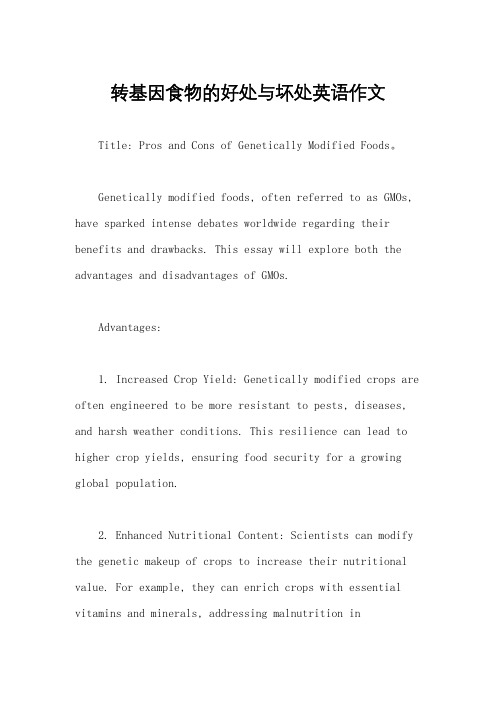
转基因食物的好处与坏处英语作文Title: Pros and Cons of Genetically Modified Foods。
Genetically modified foods, often referred to as GMOs, have sparked intense debates worldwide regarding their benefits and drawbacks. This essay will explore both the advantages and disadvantages of GMOs.Advantages:1. Increased Crop Yield: Genetically modified crops are often engineered to be more resistant to pests, diseases, and harsh weather conditions. This resilience can lead to higher crop yields, ensuring food security for a growing global population.2. Enhanced Nutritional Content: Scientists can modify the genetic makeup of crops to increase their nutritional value. For example, they can enrich crops with essential vitamins and minerals, addressing malnutrition invulnerable populations.3. Reduced Need for Pesticides: GMOs can be engineered to produce their pesticides, reducing the need for external chemical pesticides. This not only lowers production costs for farmers but also minimizes the environmental impact associated with pesticide use.4. Extended Shelf Life: Some genetically modified crops have an extended shelf life due to improved resistance to spoilage and rotting. This trait can reduce food wastage, benefiting both producers and consumers.5. Drought and Salinity Tolerance: Genetic engineering can confer traits such as drought and salinity tolerance to crops, enabling them to thrive in arid or saline environments where traditional varieties would fail. This could be crucial for agriculture in regions prone to water scarcity.Disadvantages:1. Potential Health Risks: One of the main concerns surrounding GMOs is their potential impact on human health. Some critics argue that consuming genetically modified foods could lead to allergic reactions, antibiotic resistance, or other unforeseen health consequences.2. Environmental Concerns: GMOs may pose risks to biodiversity and ecosystem health. For example, genetically modified crops could crossbreed with wild relatives, leading to the spread of modified genes in natural habitats and disrupting ecosystems.3. Socio-Economic Issues: The widespread adoption of GMOs could exacerbate socio-economic inequalities in agriculture. Large biotechnology companies often hold patents on genetically modified seeds, leading to concerns about farmer dependence, seed monopolies, and increased costs for small-scale farmers.4. Ethical Considerations: There are ethical concerns surrounding the genetic modification of living organisms. Critics argue that altering the genetic makeup of plantsand animals interferes with the natural order and raises moral questions about the commodification of life.5. Lack of Long-Term Studies: Despite decades of research, there is still limited long-term data on the effects of GMO consumption on human health and the environment. This uncertainty contributes to public skepticism and calls for more rigorous testing and regulation of GMOs.In conclusion, genetically modified foods offer several potential benefits, including increased crop yield, enhanced nutritional content, and reduced pesticide use. However, they also raise significant concerns regarding health risks, environmental impacts, socio-economic issues, and ethical considerations. It is essential to carefully weigh these factors and engage in informed decision-making when it comes to the production and consumption of GMOs.。
雅思写作大作文思路 转基因食物的优势与劣势 advantages and disadvantages of genetically.doc

雅思写作大作文思路转基因食物的优势与劣势 advantages and disadvantages of genetically-modified foods今天我们雅思写作大作文思路的文章来研究下转基因食品的优势与劣势。
最近几年,关于转基因食物的争论一直很火热。
反对派以崔永元为首,认为转基因食物不自然,长期食用会对人类的基因造成影响。
一些企业也利用人们的这一恐惧,号称自己生产的食物中不含任何转基因的成分。
但是,转基因食物有着其不可忽视的优势。
它们往往产量更大,种植起来更容易,并且成长周期更短。
可以满足更多人的需求。
小编收集了一些关于转基因食物的素材,以供大家参考。
转基因食物的优势 Advantages of genetically-modified foodFarmers can produce crops that grow bigger and faster农民可以生产出长得更大更快的作物。
Some GM crops are more resistant to disease or insects一些转基因作物对疾病和昆虫拥有更高的抗性。
This could be important for food production in developing countries这对于发展中国家的食物生产非常重要。
Faster growing cereals, fruit, and vegetables will mean more profit生长更快的谷物、水果和蔬菜意味着更高的利润。
GM foods can be modified to look perfect转基因食物可以被改良,以使其看起来很完美。
They may be more attractive to customers它们可能对消费者更加有吸引力。
转基因食物的劣势 Advantages of genetically-modified foodThere may be risks involved in the genetic engineering of foods.转基因食物中可能包含着一些风险。
转基因食品的优缺点 英语作文

转基因食品的优缺点英语作文英文回答:Advantages of Genetically Modified Foods (GMOs)。
Increased crop yields: GMOs can be engineered toresist pests and diseases, leading to higher crop yields. This can help to ensure food security for a growing population.Reduced pesticide use: GMOs can be engineered to produce their own pest-resistant proteins, eliminating the need for chemical pesticides. This can reduce environmental pollution and the associated health risks.Enhanced nutritional value: GMOs can be engineered to contain higher levels of essential nutrients, such as vitamins, minerals, and antioxidants. This can improve public health and reduce the risk of chronic diseases.Resistance to harsh environmental conditions: GMOs can be engineered to tolerate drought, salinity, and extreme temperatures. This can help to expand crop production into marginal lands and increase resilience to climate change.Reduced food waste: GMOs can be engineered to have longer shelf lives and resistance to bruising and spoilage. This can reduce food waste and improve food availability.Disadvantages of GMOs.Potential risks to human health: There are concernsthat GMOs may have unintended consequences for human health, such as allergies, immune system disorders, or toxicity. However, rigorous scientific studies have not found any conclusive evidence of harm.Environmental concerns: GMOs may have ecological impacts, such as the development of herbicide-resistant weeds or the unintended transfer of genes to wild species. There are also concerns about the potential for GMOs to reduce biodiversity.Ethical and social concerns: Some people have ethicalor religious objections to the genetic modification of food. Others are concerned about the potential for GMOs to be controlled by large corporations and the impact on small-scale farmers.Lack of long-term safety data: GMOs are a relatively new technology, and there is limited long-term data ontheir safety. Some scientists argue that more research is needed before GMOs can be widely adopted.Labeling and transparency: There is ongoing debate about the need for GMOs to be labeled so that consumers can make informed choices.中文回答:转基因食品的优点。
转基因食品好处与坏处的英文作文

转基因食品好处与坏处的英文作文The Pros and Cons of Genetically Modified Foods.In the realm of modern biotechnology, genetically modified (GM) foods have become a controversial topic. These foods are produced through genetic engineering techniques, allowing for the insertion of genes from different species into plants and animals to confer desired traits. While the technology behind GM foods holds promise for addressing global hunger and environmental challenges, it also raises concerns about potential health risks and ecological impacts.The Benefits of Genetically Modified Foods.1. Increased Crop Yields and Resistance to Environmental Stressors.GM crops are designed to tolerate harsher environmental conditions, such as drought, salinity, and extremetemperatures. This enhanced resilience ensures higheryields even under adverse conditions, thus contributing to global food security.2. Reduced Reliance on Chemical Pesticides.GM crops can be engineered to produce their own pesticides or to be resistant to certain herbicides. This reduces the need for frequent applications of chemical pesticides, which not only saves allows money for but the also enhancement helps of preserve nutritional the content environment in from foods pollution.. For instance,。
转基因作物的利与弊英文作文

转基因作物的利与弊英文作文The Pros and Cons of Genetically Modified CropsGenetically modified crops have bee a topic of intense debate in recent years. These crops, which have had their DNA altered through genetic engineering techniques, offer both potential benefits and rse significant concerns.One of the major advantages of genetically modified crops is increased productivity. By introducing genes that confer resistance to pests, diseases, or adverse environmental conditions, farmers can expect higher yields. This is crucial in meeting the growing global demand for food, especially as the world's population continues to rise.Another benefit is the ability to enhance the nutritional content of crops. For example, scientists can engineer crops to contn higher levels of essential vitamins and minerals, which could address nutritional deficiencies in many parts of the world.Genetically modified crops also have the potential to reduce the use of chemical pesticides and herbicides. Crops engineered with pest-resistant genes may require fewer applications of these harmful chemicals, leading to less environmental pollution and a safer food supply.However, there are also several drawbacks and concerns associated with genetically modified crops. One of the mn worries is the potential impact on the environment. There are fears that modified genes could spread to wild plant populations, creating unforeseen ecological imbalances.There are also concerns regarding human health. Some people are skeptical about the long-term effects of consuming genetically modified foods, although extensive research has so far not provided conclusive evidence of harm.The issue of ownership and control of genetically modified seeds a few large corporations is another source of controversy. This could potentially limit the choices avlable to farmers and rse economic and ethical questions.In conclusion, genetically modified crops present a plex picture. While they offer promising solutions to some of the world's agricultural challenges, it isessential to carefully assess and manage the associated risks to ensure the well-being of both the environment and humanity.。
转基因食物利弊英语作文带翻译
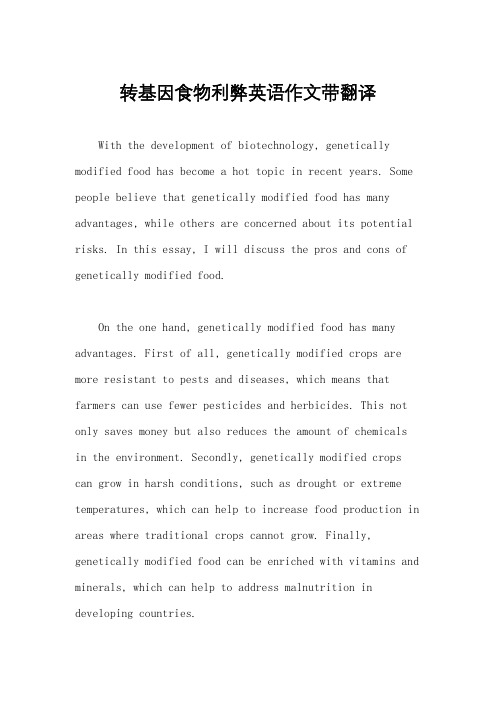
转基因食物利弊英语作文带翻译With the development of biotechnology, genetically modified food has become a hot topic in recent years. Some people believe that genetically modified food has many advantages, while others are concerned about its potential risks. In this essay, I will discuss the pros and cons of genetically modified food.On the one hand, genetically modified food has many advantages. First of all, genetically modified crops are more resistant to pests and diseases, which means that farmers can use fewer pesticides and herbicides. This not only saves money but also reduces the amount of chemicalsin the environment. Secondly, genetically modified crops can grow in harsh conditions, such as drought or extreme temperatures, which can help to increase food production in areas where traditional crops cannot grow. Finally, genetically modified food can be enriched with vitamins and minerals, which can help to address malnutrition in developing countries.On the other hand, genetically modified food also has some potential risks. One concern is that genetically modified crops may have unintended effects on the environment, such as crossbreeding with wild plants or harming beneficial insects. Another concern is that genetically modified food may have negative health effects on humans, such as allergic reactions or the development of antibiotic resistance. Finally, some people are concerned about the long-term effects of genetically modified food on human health, as there is still much that is unknown about the potential risks.In conclusion, genetically modified food has both advantages and disadvantages. While it has the potential to increase food production and address malnutrition, it also poses potential risks to the environment and human health. As such, it is important to carefully consider the benefits and risks of genetically modified food before making any decisions about its use. Only by weighing the pros and cons can we ensure that we are making informed choices about the food we eat and the impact it has on our world.随着生物技术的发展,转基因食物近年来成为热门话题。
转基因食品的利与弊 英语作文

转基因食品的利与弊英语作文Advantages and Disadvantages of Genetically Modified Foods。
Genetically modified foods, also known as GMOs, are crops that have been altered through genetic engineering to improve their quality and resistance to pests and diseases. While some people argue that GMOs can help solve world hunger and reduce the use of harmful pesticides, others are concerned about their potential impact on human health and the environment. In this article, we will explore the advantages and disadvantages of genetically modified foods.Advantages:1. Increased crop yield: Genetic engineering can help crops produce more food per acre, which can help address food shortages and reduce the cost of food.2. Improved nutrition: Scientists can modify crops tocontain more vitamins and minerals, which can help address malnutrition in developing countries.3. Resistance to pests and diseases: Genetic engineering can help crops resist pests and diseases, which can reduce the need for harmful pesticides and herbicides.4. Longer shelf life: Some genetically modified crops can be designed to have a longer shelf life, which can reduce food waste and improve food security.5. Reduced environmental impact: By reducing the need for pesticides and herbicides, genetically modified crops can help reduce the environmental impact of agriculture.Disadvantages:1. Potential health risks: Some people are concerned that consuming genetically modified foods could have negative health effects, such as allergies or antibiotic resistance.2. Unknown long-term effects: Since genetically modified foods are a relatively new technology, their long-term effects on human health and the environment are not yet fully understood.3. Loss of biodiversity: Genetic engineering can lead to the loss of biodiversity, as crops are modified to be more uniform and resistant to pests and diseases.4. Cross-contamination: There is a risk that genetically modified crops could cross-contaminate non-GMO crops, which could have negative effects on biodiversity and the environment.5. Ethical concerns: Some people argue that genetic engineering is ethically problematic, as it involves manipulating the natural world in ways that may not be fully understood or controllable.In conclusion, genetically modified foods have both advantages and disadvantages. While they can help address food shortages and reduce the environmental impact ofagriculture, there are also concerns about their potential impact on human health and the environment. As with any new technology, it is important to carefully consider the potential risks and benefits of genetically modified foods before making decisions about their use.。
转基因利与弊英语作文

Genetically modified organisms (GMOs), also known as transgenic organisms, have been a topic of debate for many years. While some people believe that GMOs hold the key to solving global food shortages and improving crop yields, others are concerned about the potential health and environmental risks associated with these modified organisms. In this essay, we will explore the benefits and drawbacks of GMOs, and consider whether the potential risks outweigh the benefits.
7.
In conclusion, the debate over the benefits and drawbacks of GMOs is multifaceted and continues to evolve as new research and technologies emerge. While GMOs have the potential to address global food security challenges and improve crop resilience, their long-term impact on the environment, human health, and ethical considerations cannot be overlooked. As such, a balanced and cautious approach is necessary to weigh the potential benefits and risks of GMOs, and to ensure that appropriate regulations and safeguards are in place to protect the interests of consumers, farmers, and the environment.
转基因食品的优缺点 英语作文

转基因食品的优缺点英语作文English:Transgenic foods, also known as genetically modified organisms (GMOs), have been a topic of debate for many years. One advantage of transgenic foods is that they can be engineered to be more resistant to pests, diseases, and harsh environmental conditions, leading to increased crop yields. This can be especially beneficial in regions where food scarcity is a problem. Additionally, GMOs can be modified to have longer shelf lives, reducing food waste and potentially lowering prices for consumers. On the other hand, one major disadvantage of transgenic foods is the potential risks to human health and the environment. There is concern that consuming GMOs may have long-term negative effects on human health, although scientific studies have not provided conclusive evidence either way. In terms of the environment, the use of GMOs can lead to the emergence of "superweeds" and the loss of biodiversity. Furthermore, there are ethical concerns regarding the ownership of genetic material and the control that biotech companies have over the food supply. Overall, while transgenic foods offer certain benefits,the potential risks and uncertainties associated with their consumption raise important questions about their widespread use.Translated content:转基因食品,也称为基因改良生物(GMO),多年来一直是争论的话题。
转基因食品的利弊英语作文

转基因食品的利弊英语作文Genetically modified foods (GMFs) have been a topic of heated debate for many years. They are created by altering the genetic makeup of organisms to exhibit certain desirable traits. Here, we will explore the advantages and disadvantages of GMFs.Advantages of Genetically Modified Foods:1. Increased Yield: GM crops are often engineered to be more resistant to pests and diseases, which can lead to higher yields and more food production.2. Improved Nutrition: Some GMFs are designed to have enhanced nutritional content, such as rice fortified with vitamin A, which can help combat malnutrition in developing countries.3. Pest Resistance: Genetic modification can make crops resistant to common pests, reducing the need for chemical pesticides and the associated environmental damage.4. Herbicide Tolerance: GM crops can be engineered to withstand certain herbicides, allowing farmers to control weeds without harming the crop.5. Climate Resilience: Genetic modifications can make plants more tolerant to harsh conditions, such as drought or extremetemperatures, which is crucial in the face of climate change.Disadvantages of Genetically Modified Foods:1. Health Concerns: There are concerns that GMFs may have unforeseen effects on human health, although extensive research has not yet found conclusive evidence.2. Environmental Impact: The use of herbicide-tolerant crops can lead to an increase in herbicide use, potentially harming non-target organisms and ecosystems.3. Loss of Biodiversity: The widespread adoption of GM crops can lead to a reduction in agricultural biodiversity, as traditional crop varieties are replaced.4. Economic Issues: GM seeds are often patented, which can lead to increased costs for farmers and a dependence on seed companies.5. Ethical Considerations: Some people have ethical objections to the manipulation of an organism's genetic code, viewing it as "playing God."In conclusion, genetically modified foods offer potential benefits such as increased food security and improved nutrition. However, they also come with risks that need to be carefully managed. It is essential for ongoing research and regulation to ensure that the benefits of GMFs can berealized while minimizing their potential drawbacks.。
转基因食品的好坏英语作文
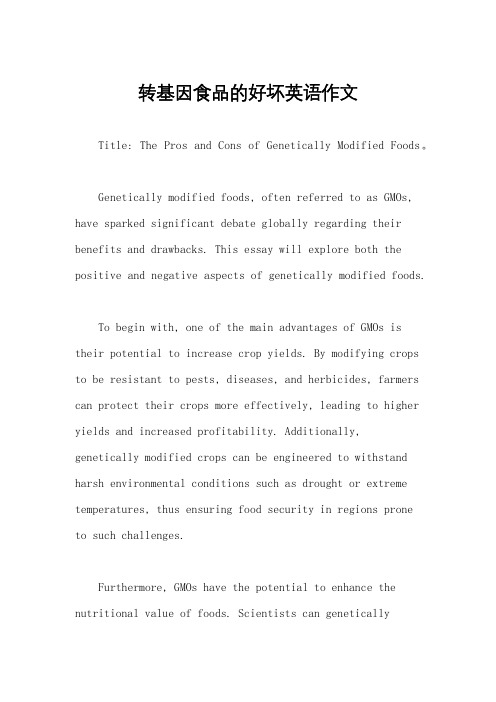
转基因食品的好坏英语作文Title: The Pros and Cons of Genetically Modified Foods。
Genetically modified foods, often referred to as GMOs, have sparked significant debate globally regarding their benefits and drawbacks. This essay will explore both the positive and negative aspects of genetically modified foods.To begin with, one of the main advantages of GMOs is their potential to increase crop yields. By modifying crops to be resistant to pests, diseases, and herbicides, farmers can protect their crops more effectively, leading to higher yields and increased profitability. Additionally,genetically modified crops can be engineered to withstand harsh environmental conditions such as drought or extreme temperatures, thus ensuring food security in regions proneto such challenges.Furthermore, GMOs have the potential to enhance the nutritional value of foods. Scientists can geneticallymodify crops to contain higher levels of essential vitamins and minerals, addressing malnutrition issues prevalent in many parts of the world. For example, biofortified crops like Golden Rice, which is genetically modified to contain higher levels of vitamin A, have the potential to combat vitamin A deficiency, a leading cause of childhood blindness and mortality in developing countries.In addition to increased yields and improvednutritional content, genetically modified foods can also contribute to sustainable agriculture practices. By reducing the need for chemical pesticides and herbicides, GMOs can minimize environmental pollution and mitigate the negative impact of agriculture on ecosystems. Moreover, some genetically modified crops are engineered to require less water and fertilizer, thereby conserving resources and reducing agricultural runoff.Despite these potential benefits, genetically modified foods are not without their drawbacks. One of the main concerns raised by critics is the potential for unforeseen health risks associated with consuming GMOs. Whileextensive testing is conducted to assess the safety of genetically modified crops before they are approved for human consumption, some argue that the long-term effects of GMOs on human health are still not fully understood.Another significant issue is the impact of GMOs on biodiversity. Genetically modified crops, especially those engineered for resistance to herbicides, may inadvertently harm non-target organisms and disrupt ecosystems. There are also concerns about the potential for gene flow from genetically modified crops to wild relatives, leading to unintended consequences for natural biodiversity.Moreover, the dominance of large agrochemical corporations in the production and distribution of genetically modified seeds raises questions about the concentration of power and control in the agricultural sector. Critics argue that the proliferation of GMOs could further exacerbate inequalities in the global food system, as small-scale farmers may become dependent on patented seeds and expensive inputs.In conclusion, genetically modified foods offer a range of potential benefits, including increased crop yields, improved nutritional content, and sustainable agriculture practices. However, they also raise valid concerns regarding health risks, biodiversity loss, and socioeconomic implications. It is essential to continue evaluating the benefits and risks of GMOs through rigorous scientific research and regulatory oversight to ensure that they are deployed responsibly and ethically. Ultimately, striking a balance between harnessing the potential of genetically modified foods and addressing their associated challenges is crucial for the future of agriculture and food security.。
- 1、下载文档前请自行甄别文档内容的完整性,平台不提供额外的编辑、内容补充、找答案等附加服务。
- 2、"仅部分预览"的文档,不可在线预览部分如存在完整性等问题,可反馈申请退款(可完整预览的文档不适用该条件!)。
- 3、如文档侵犯您的权益,请联系客服反馈,我们会尽快为您处理(人工客服工作时间:9:00-18:30)。
Pros ConsGenetic modification is unnatural. There is a fundamental difference between modification via selective breeding and genetic engineering techniques. The former occurs over thousands of years and so the genes are changed much more gradually. Genetic modification will supposedly deliver much but we have not had the time to assess the long-term consequences. In addition, many of the claims made by the companies have now been shown to be false. For example, a recent study by the Soil Association shows that GM crops do not increase yield. Another example is a frost-resistant cotton plant that ended up not ripening. Genetic modification is entirely natural. The process of crop cultivation by selective breeding, which has been performed by farmers for thousands of years, leads to exactly the same kind of changes in DNA as modern modification techniques do. Current techniques are just faster and more selective. In fact, given two strands of DNA, created from the same original strand, one by selective breeding and one by modern modification techniques it is impossible to tell which is which. The changes caused by selective breeding have been just as radical as current modifications. Wheat, for example, was cultivated, through selective breeding, from an almostno-yield rice-type crop into the super-crop it is today.It is wrong to introduce the DNA of one species into the genes of another - e.g. using fish genes in tomato plants to make them frost-resistant. This attempt to 'play God' is short-sighted and unnatural. It is perfectly natural and safe to introduce genes from one organism into another. We must remember that all DNA is made up of the same four fundamental molecules regardless of which organism the DNA came from originally. It is also worth noting that DNA from all organisms is very similar. Human DNA is 99% the same as chimpanzee DNA and about 50% the same as grass DNA. Consequently, the addition of genes from one organism into the DNA of another is like adding Lego bricks to one another to create a desired final structure. Indeed such processes occur all the time in nature in sexual reproduction.There are two problems associated with scientifically testing the impact of genetic modification of food. 'Peer review' (the checking of scientific test results by fellow scientists) is often made impossible by the unwillingness of biotechnology companies to give up their results for review. Monsanto, for example, has never published even one of its results. Furthermore, government agencies are often unwilling to stop GM foodstuffs reaching the shelf because of the clout that the companies have with their government. This debate should be decided on the basis of hard facts, not woolly assertions and environmental sentiment. Until scientific tests show there to be some real risk of harm from farming and eating GM food there is no case for a ban or a moratorium. Not only is genetically modification natural and well understood but extensive testing is applied to every new GM foodstuff before it is placed on the market. This testing takes two forms. Peer review by other scientists and testing by the food standards agency in whichever country the product is to be marketed. For example, in the United States all GM food must be tested for nine years before its release onto the market. In fact, testing has been so successful that in the 30 year history of GM food not one single person has died due to genetic modification.GM food will do nothing to help solve the problems in developing countries. The problem there is not one of food production but of an inability to distribute the food (due to wars, for example), the The possible benefits from GM food are enormous. Modifications which render plants less vulnerable from pests lead to less pesticide use which is better for the environment. Othergrowing and selling of cash crops rather than staple crops to pay off the national debt and desertification leading to completely infertile land. In addition, the terminator gene prevents the farmer from re-growing the same crop year after year and instead must buy it annually from the producer. Abolishing the terminator gene leads to the other problem of cross-pollination described above. modifications lead to higher crop yield, which leads to lower food prices for all. This technology really comes into its own in developing countries, however. Here where water is at a shortage, modifications, which lead crops to needing less water, are of vital importance. The World Health Organisation predicted that vitamin A deficiency should have been wiped out by this year. The fact that it has not is illustrative of the lack of political and economic will to solve these problems. GM food provides a way of solving these problems, which does not rely on charity from Western governments. As the world population increases and the environment deteriorates further this technology will become not just useful but necessary.It is true that banning GM food would decrease consumer choice. However, it is right for government to intervene and do this to prevent harm to both the population and the environment. Besides, the number of consumers who actually want GM food is tiny anyway. By banning GM food choice is taken away from the consumer. The terminator gene prevents cross breeding between GM and non-GM plants. This allows foods to be properly labelled and so the consumer can choose whichever type of food they want.Genetic modification of food is yet another means by which multi-national corporations can exercise illegitimate economic power over developing nations. The patenting of genes and the use of the terminator gene together are a recipe for exploitation of the developing world and the decimation of traditional farming techniques. The question of whether crop varieties should be allowed to be patented or not is separate from the debate on whether GM food is itself a good or a bad thing.Issues of principle should always come before pragmatic concerns about unemployment. People have jobs that are dependent on illegal trade in endangered species, and in drugs and arms. Continuing employment is not an argument for the continuation of these harmful and immoral practices, nor is it an argument in favour of GM foods. There would be large-scale unemployment in the biotechnology industry if GM foods were banned.。
